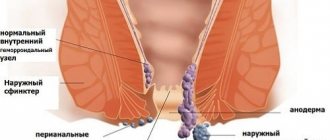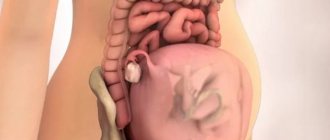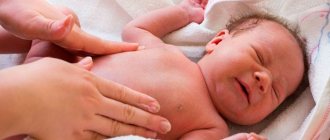Diarrhea is a harbinger of labor
The resulting diarrhea at 40 weeks is an unpleasant sign, which during this period often becomes a harbinger of childbirth, but if it appears at the beginning of pregnancy, it requires the woman to follow a certain diet.
At this stage, the body is vigorously preparing for the expected birth. There is active production of prostaglandin, a hormone that affects:
- connective tissue;
- pelvic bones;
- softening the cervix.
Abdominal prolapse is also observed here. At this time, the baby in the uterus lowers its head down, preparing to exit, as a result of which the pressure on the large intestine increases, the uterus presses on the stomach. After the abdomen subsides, almost all women’s stool softens and a frequent urge appears.
When your health suddenly changes and contractions appear, you need to call an ambulance without indicating an intestinal disorder, since doctors can refer the pregnant woman to the infectious diseases department.
Is diarrhea normal or pathological?
If a woman gives birth for the first time, diarrhea occurs during pregnancy at the 38-39th week; for the second and subsequent times, the phenomenon may occur immediately before childbirth. At the same time, frequent urination may occur. All this is completely normal, the body is simply preparing for the process of childbirth and, in order to avoid unpleasant situations during the process, “prepares” the expectant mother in advance. It is difficult to fall asleep at night. These are, of course, uncomfortable sensations, but you shouldn’t be afraid of them.
It is worth noting that nausea also appears. Diarrhea and nausea at the 39th week of pregnancy are a kind of natural cleansing of the body. During this period, your appetite may disappear, or, on the contrary, it may increase. Taste preferences change.
Symptoms approaching labor
If the fortieth week of pregnancy has arrived, in addition to watery stool, there is a tugging in the lower abdomen, this indicates an imminent birth. The situation is associated with additional features:
- The stomach turns to stone - the nagging pain spreads to the pelvis and lower back. The bones begin to expand slightly to make it easier for the child to pass through the birth canal, the muscles support the large mass of the uterus and the baby, in this regard, such painful feelings are considered completely natural and notify that the body is preparing;
- discharge of the mucus plug - white, odorless or mucous discharge is normal;
- drooping of the abdomen - indicates the imminent approach of childbirth;
- nausea, loose stools - at week 40, mild diarrhea is noted as a harbinger, the woman feels sick, her appetite decreases or is lost;
- frequent urination.
It is very important to monitor the discharge; often the amniotic fluid does not come out immediately, but gradually, which can be felt in the wet underwear. When there is permission for water, you need to lie down on a sheet, lie down for a while, and relax. If you find a wet, colorless spot, you need to go to the hospital. However, when a green or yellow spot is observed, this indicates that the baby does not have enough oxygen, then you should immediately go to give birth.
Abdominal pain is often caused by training contractions. When they are felt in the lower abdomen, and are also accompanied by bloody brown discharge, then, most likely, complete detachment of the placenta occurs. In such a situation, it is necessary to call an ambulance.
Sex at 40 weeks is not strictly prohibited, but, on the contrary, is a natural intensification of labor. Prostaglandins found in male sperm help stimulate contractile activity.
When is diarrhea a danger sign?
Diarrhea in the late stages of pregnancy does not always become a harbinger of childbirth. Sometimes diarrhea is dangerous for the expectant mother and baby. If the symptom is observed for more than 3 days, the condition does not normalize, childbirth does not occur, this may indicate an intestinal infection. If nothing is done, both the fetus and the woman can suffer.
Intestinal infection is expressed by the following manifestations:
- increased body temperature;
- chills and vomiting;
- diarrhea;
- pain in the intestines;
- nausea.
It happens that stool comes out with particles of undigested food, blood impurities and mucus.
Often, signs of intestinal disorders occur during ARVI. Here the doctor determines which medications are suitable for treatment at such a late stage. Severe stress can also lead to symptoms.
Sometimes severe diarrhea leads to the formation of hemorrhoids. Then the specialist prescribes topical suppositories, which are approved for pregnant women.
What happens to the body and why does diarrhea occur?
Diarrhea is always a concern, and before giving birth this phenomenon makes almost every woman nervous. Not everyone knows that diarrhea is a harbinger of childbirth. And it indicates the approaching birth of the baby, as well as drooping of the abdomen, false contractions, removal of the plug and “nesting”, when the expectant mother, already with a large belly, cleans the house.
The appearance of diarrhea is easy to explain. Nature provides everything. And there are two reasons for loose stools. Firstly, the fetus is already large, it has reached its maximum size, and the uterus has increased from 60-70 grams to 1 kilogram! Not surprisingly, there is pain in the lower abdomen and diarrhea - this is an understandable answer. The baby is already pressing on the intestines, and it is being cleansed. Secondly, nature takes care of easy childbirth and the comfort of mother and baby. An empty intestine allows the fetus to pass freely.
After the reasons have become clear, women want to know when to expect diarrhea and how long it will last. And doctors do not answer this question with exact dates. The processes that take place in each woman are individual. Cleansing depends on many factors, in some cases there is none at all, but then an enema is required directly in the maternity hospital. Doctors say that you need to wait at 38-39 weeks. Mothers who have given birth say that loose stools caught them at 39-40 weeks. Sometimes this phenomenon occurs a couple of days before birth.
Treatment
Under no circumstances should you treat loose stools at 40 weeks on your own. To eliminate diarrhea, you must first determine the cause of its occurrence. Only a specialist can establish a diagnosis and prescribe appropriate treatment:
- If frequent bowel movements are preceded by digestive diseases, you will need a certain diet and split meals.
- In case of nervous shock, sedative medications will help eliminate diarrhea. Herbal preparations are prescribed for pregnant women.
- In case of intestinal infection, a pregnant woman cannot do without antibiotics; less gentle means are selected.
- When watery stool occurs due to food poisoning, absorbents will be needed. They help in a short time to remove harmful substances from the body that pose a threat to the child’s life.
It is very important to drink plenty of fluids when you have bowel movements to avoid dehydration. Adjust your diet, exclude fatty, fried, spicy foods, smoked foods, fresh fruits and vegetables.
Precaution during pregnancy
If you have intense diarrhea during pregnancy, you do not need to resort to traditional recipes. It is unknown how they will manifest themselves on the child.
To protect yourself from the appearance of an unpleasant symptom and not harm the baby, preventive measures are necessary:
- exclude heavy foods;
- products must be carefully processed;
- wash fruits and vegetables well;
- maintain hand hygiene;
- do not use medications unless prescribed by a specialist;
- do not use herbal formulations, as many can be abortifacient.
Diarrhea at 40 weeks of pregnancy is not always a harbinger of labor. When accompanying signs are added to a symptom, this is already a deviation from the norm. This should under no circumstances be ignored; it is better to trust a competent doctor. During pregnancy, positive emotions and a sensitive attitude towards your body are important.
Source of the article: https://gastrot.ru/diareya/ponos-na-40-nedele-beremennosti
Prevention
To prevent pathological diarrhea at 40 weeks of gestation, it is recommended to adhere to the following preventive measures:
- observe the rules of personal hygiene;
- thermally process eggs, meat, fish;
- wash fruits and vegetables thoroughly, but it is better to eat them boiled or baked;
- treat chronic pathologies in a timely manner;
- watch your weight;
- don't overeat;
- do not try new and exotic dishes;
- avoid contact with infected people;
- store food correctly to prevent poisoning;
- In the summer, completely give up fish.
If you experience diarrhea at 40 weeks of pregnancy, immediately notify your gynecologist, who will refer you to other specialists for further examination. Remember that you are responsible not only for yourself, but also for your unborn baby.
Previous post Why does prolonged diarrhea occur, and how to cure it?
Next entry Diarrhea of viral origin: how to recognize and treat?
Causes of diarrhea at 40 weeks of pregnancy
The main cause of diarrhea in late gestation is prenatal activity. Liquid stools form from 37 weeks. This is a physiological process associated with the lowering of the uterine fundus and pressure on the rectum and bladder. The body, in preparation for childbirth, actively cleanses itself, especially during the first pregnancy. Additional signs are nausea, vomiting.
Other physiological causes that are not dangerous include hormonal changes, during which the hormone prostaglandin is actively produced. Physical activity plays an important role, which should be reduced during this period.
But there are pathological reasons that should alert a pregnant woman:
p, blockquote 5,0,1,0,0 —>
- Intoxication of the body with drugs, poisonous gases, household and other chemicals, food. Poisoning is accompanied not only by loose stools, but also by vomiting, dizziness, pain syndromes, increased body temperature, bloating and weakness.
- Infection with viruses, bacilli, bacteria (salmonella, enterovirus, rotavirus, cholera, dysentery, etc.). This is due to the woman’s reduced immunity. Diarrhea occurs when infected with nausea and vomiting, loss of appetite, chills, and high body temperature.
- Helminth infestation is considered a dangerous cause, since helminth larvae penetrate the fetus, causing it harm. During growth and reproduction, worms eat all the beneficial substances, leaving behind toxic waste products. When a helminthic infection occurs, frequent diarrhea occurs, appetite increases, weight decreases, and muscle pain is felt. Features: teeth grinding, craving for sweets, itching in the anus, lethargy, mental disorders.
- Unusual reactions of the body to familiar foods occur due to hormonal imbalances. At week 40, the body reacts negatively even to fresh vegetables and fruits.
Listed above are the main causes of diarrhea during pregnancy. However, there are a number of other, less common reasons:
p, blockquote 6,0,0,0,0 —>
- stressful situations, excessive worries and worries;
- diabetes mellitus and other diseases of the endocrine system;
- intestinal ischemia;
- vasculitis;
- failure of the liver;
- gastritis and pancreatitis;
- irritable bowel syndrome;
- consumption of alcoholic beverages;
- eclampsia as a complication of pregnancy.
Symptoms of diarrhea for a long time
To accurately determine that diarrhea is caused by impending labor, it is necessary to monitor the stool and accompanying symptoms. Even if a woman is not yet having contractions, the onset of labor can be predicted by the presence of certain signs:
- I have a stomachache;
- Constantly pulling in the lower back;
- increased gas formation appears;
- morning nausea and vomiting develops;
- chills;
- temperature rises;
- headache.
No treatment is required for these symptoms. They go away on their own as labor progresses.
We recommend: Is diarrhea dangerous in early pregnancy?
If diarrhea is accompanied by the release of blood and mucus, you should immediately consult a doctor, or even call an ambulance. Such symptoms indicate the presence of an infection that requires urgent treatment.
Is diarrhea dangerous at 40 weeks of pregnancy?
If diarrhea is physiological in nature, then there is no need to worry about this, but with prolonged diarrhea against the background of pathological changes, the following consequences may occur:
p, blockquote 7,0,0,0,0 —>
- Dehydration of the body, leading to the development of diseases of various body systems, including death. This is due to the fact that the water-salt balance is disturbed, all useful substances are washed out, which helps to thicken the blood and slow blood circulation. Dehydration is manifested by increased weakness, dizziness, decreased blood pressure, dry mouth, thirst, and drowsiness. A woman’s number of daily urinations decreases, dark circles form under her eyes, and noise is felt in her ears. As dehydration progresses, fainting may occur.
- Diarrhea leads to increased peristalsis and motility, which increases uterine contractions - labor may begin prematurely.
- Danger to the fetus - infection, deficiency of nutrients. In the future, this is fraught with hypoxia (oxygen starvation), delayed development of the newborn, the occurrence of chronic diseases, and death.
Diagnostics
Diagnostic measures when diarrhea occurs at 40 weeks of pregnancy are necessary to determine the cause of diarrhea, which will allow timely treatment to begin, avoiding complications for the mother and fetus.
What examination is prescribed:
p, blockquote 9,0,0,0,0 —>
- Laboratory testing includes stool and blood sampling for general and biochemical analysis. This allows you to identify infections and determine the degree of dehydration of the body.
- Instrumental diagnostics - ultrasound examination of the gallbladder, kidneys, spleen, liver, pancreas, endoscopy, coprogram.
Treatment
The method of therapeutic approach is determined based on the cause of diarrhea. An obligatory point is the elimination of unpleasant symptoms, restoration of disturbed microflora, peristalsis, and motility. Treatment includes taking medications, using folk remedies, dietary nutrition and special exercises.
Nutrition
The diet is based on normalizing the functionality of the digestive system. rules must be followed :
p, blockquote 12,0,0,0,0 —>
- strictly monitor your water regime - drink at least 2 liters of water;
- eat food 5-6 times a day in small portions;
- on the first day of diarrhea, completely refuse food, then introduce permitted cereals and boiled vegetables;
- food should have a temperature no higher than +37 degrees;
- Steam or boil dishes (in extreme cases, bake without fat).
Prohibited foods:
p, blockquote 13,0,0,0,0 —>
- coffee, carbonated drinks;
- vegetables - cucumbers, radishes, radishes, beets;
- fruits that cause loose stools (apples, plums, apricots, etc.);
- sweets in any form;
- baked goods;
- canned food;
- smoked meats, ham, sausages;
- fast food;
- fatty meat and fish;
- juices;
- milk;
- beans.
What is allowed and recommended:
p, blockquote 14,0,0,0,0 —>
- porridge of rice and oatmeal;
- boiled lean meat and fish;
- decoctions of herbs, rose hips;
- fruits – persimmon, banana, quince;
- baked apples;
- hard boiled eggs;
- unsweetened yogurt;
- tea.
Gymnastic exercises
Thanks to physical activity (special exercises), intestinal motility is restored, the woman’s emotional state is normalized, and blood circulation is accelerated. However, at 40 weeks of pregnancy, many gymnastic exercises are contraindicated, so it is better to use breathing exercises that do not harm the fetus and mother.
Breathing exercises (performed in a sitting or standing position):
p, blockquote 17,0,0,0,0 —>
- Take a deep breath, then exhale, holding your breath. Draw your stomach in for a count of 3. Inhale again, relaxing your abdominal muscles.
- The second exercise is identical to the first, but with the difference that now the stomach should not be pulled in, but inflated.
- Start inhaling, holding your breath for a couple of seconds, tensing your diaphragm. While continuing to inhale air, push your abdominal cavity forward. After holding your breath for another 3 seconds, inflate your stomach and immediately relax while inhaling.
- Quickly draw in your stomach and exhale at the same time. Hold your breath for 4 seconds, then relax your muscular system. Inhale, expanding your belly.
Taking medications
At 40 weeks of pregnancy, the fetus is considered fully formed, so doctors allow you to take many medications. What can be prescribed:
p, blockquote 18,0,0,0,0 —>
- The first thing to do is to eliminate dehydration, for which rehydrating solutions are used - Regidron, Trisol, Gudron. They are based on salt and water.
- To normalize the microflora and remove toxic deposits (in case of poisoning and infection), adsorbents are used - Smecta, Polysorb, Activated carbon, Enterosgel, Polyphepan.
- Imodium, Diara, Lopedium, Enterobene are used to bind feces.
- To normalize the microflora, pro- and prebiotics are needed: Linek-s, Bifiform, Baktisubtil.
To eliminate the root cause, the doctor prescribes specific treatment (for helminthic infestations - anthelmintics, for allergies - antihistamines, etc.). The duration and course of pregnancy and the individual characteristics of the body must be taken into account.
Diarrhea before childbirth: causes, how to help the body
During pregnancy, a woman's body undergoes many changes from the first to the last days. It is important to know what is normal and what you should pay attention to. Diarrhea before childbirth is common, although initially alarming. But in order to protect herself and her baby, a woman needs to know when it appears, whether it is worth seeing a doctor and what can be done in the future.
Dietary recommendations
Before giving birth, you should think about the correctness and usefulness of nutrition. This will not only ease the symptoms of diarrhea, but also normalize other processes in the woman’s body. When choosing products, you need to take into account not only your own preferences, but also the possible reactions of the body. A gynecologist's advice wouldn't hurt.
There is no place for products with a laxative effect in the diet of an expectant mother - this is the basic rule when diarrhea continues for a long time and causes inconvenience. However, we must remember that during this difficult and important period the body must receive the maximum amount of nutrients.
Limiting the amount of junk food is necessary not only because of diarrhea, but also for the safety of the child. This list includes fatty and fried foods. Sweets and large amounts of salt and spices are not welcome.
Particular attention should be paid to the quality and quantity of fluid consumed. You need to drink more clean water.
It is better to give preference to liquid porridges. If the pregnant woman’s condition is satisfactory, then you can add vegetables and meat to the menu.
2-3 days before the expected birth, it is necessary to reduce the caloric intake of the diet and not overeat, and on the day of birth, do not eat anything at all. It is especially important to completely reduce your consumption of bread.
Rice, rice water and natural yoghurts with probiotics will bring good results for diarrhea.
It is important to monitor the quality of food and good heat treatment.
When is the best time to see a doctor?
If with diarrhea there are no other symptoms of imminent labor (prolapse of the abdomen, lower back pain, removal of the plug), and your health worsens, then you should consult a doctor to determine further actions. What serves as an alarm signal:
- Sharp, prolonged pain in the abdomen.
- Change in color of diarrhea, foul odor, impurities in the stool and the presence of foam in it.
- Vomiting is a bad sign that should immediately alert you.
- Headache, nausea, increased body temperature.
- Cramps.
- Intense thirst. Normally, diarrhea before childbirth should not cause thirst. Feces are excreted in small portions, and therefore dehydration does not occur. If diarrhea is caused by other reasons, then the body is deprived of a large amount of fluid.
The presence of fever, nausea and vomiting indicates poisoning or infection. If these symptoms appear, you should consult a doctor immediately. The toxins that arise in this case are dangerous for the baby.
Traditional methods
If diarrhea is not associated with infection in the body, then with the permission of a doctor, you can turn to traditional methods to make you feel better. It must be remembered that the cause of loose stools is sometimes anxiety and stress. Many herbs have a mild sedative effect.
Water with potato starch is a good sorbent. It can be consumed 2 times a day. Cooking does not take much time, because starch and water are readily available. For half a glass of water you need to take 1 teaspoon of dry matter.
Motherwort or mint helps relieve nervous tension. Plants are added to tea or to make infusions.
Pomegranate is not only tasty, but also useful for intestinal upset. Its peel contains substances that kill harmful microbes and have an astringent and anti-inflammatory effect. To use this remedy, you need to pour a glass of boiling water over the crusts and drink it like regular tea after two hours.
It is important to buy pomegranate only when ripe, select it carefully and wash it before use. If you are not sure that it is chemical-free, then it is better to turn to other methods.
Rosehip is an effective remedy for diarrhea. It is used to make jelly, compote, infusion, and tea. Blueberries wouldn't hurt either.
Congee is made only from unpolished rice. You need to pour a cup of cereal with 7 glasses of water and boil for 15-20 minutes over low heat. The resulting liquid is drunk every two hours, a third of a glass.
Prevention
Three or four weeks before the expected date of birth, preventive measures are taken. Doctors advise following these rules:
- You need to monitor the quality and usefulness of the food you eat. The main thing is as few preservatives as possible, more vegetables.
- Expired products should not be allowed on the menu.
- All food must be thoroughly thermally processed and food must be washed before cooking.
- The healthiest food is homemade. This is the only way to gain confidence in its quality and correct processing and preparation.
- It is important to follow all hygiene rules.
Source: https://bezponosa.ru/pri-beremennosti/ponos-pered-rodami.html








